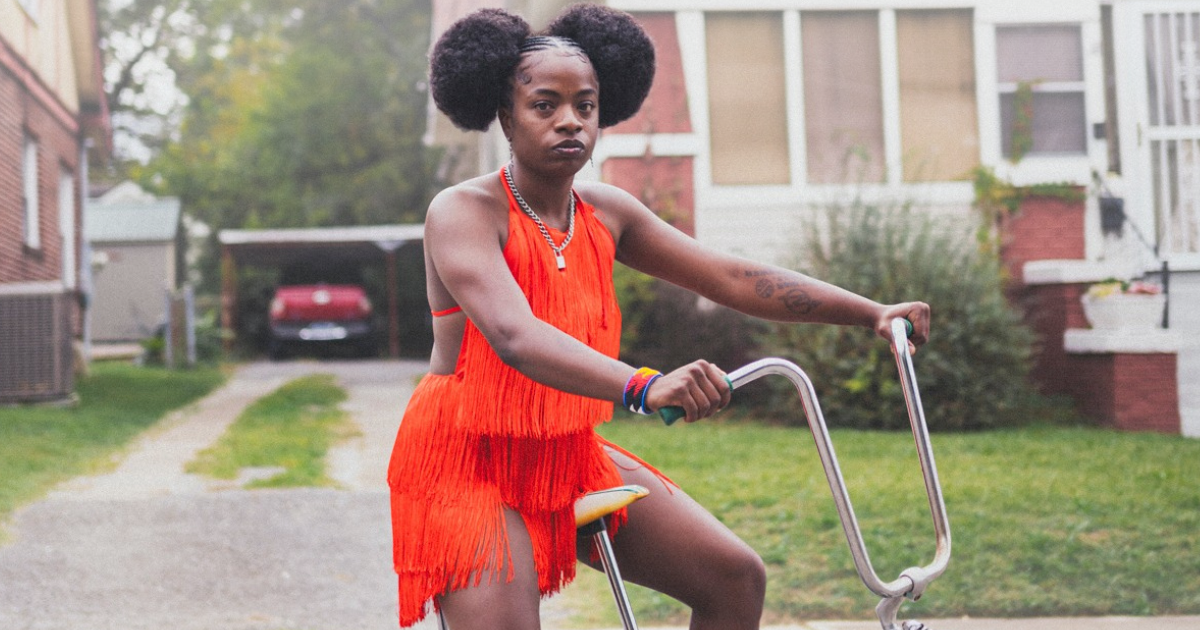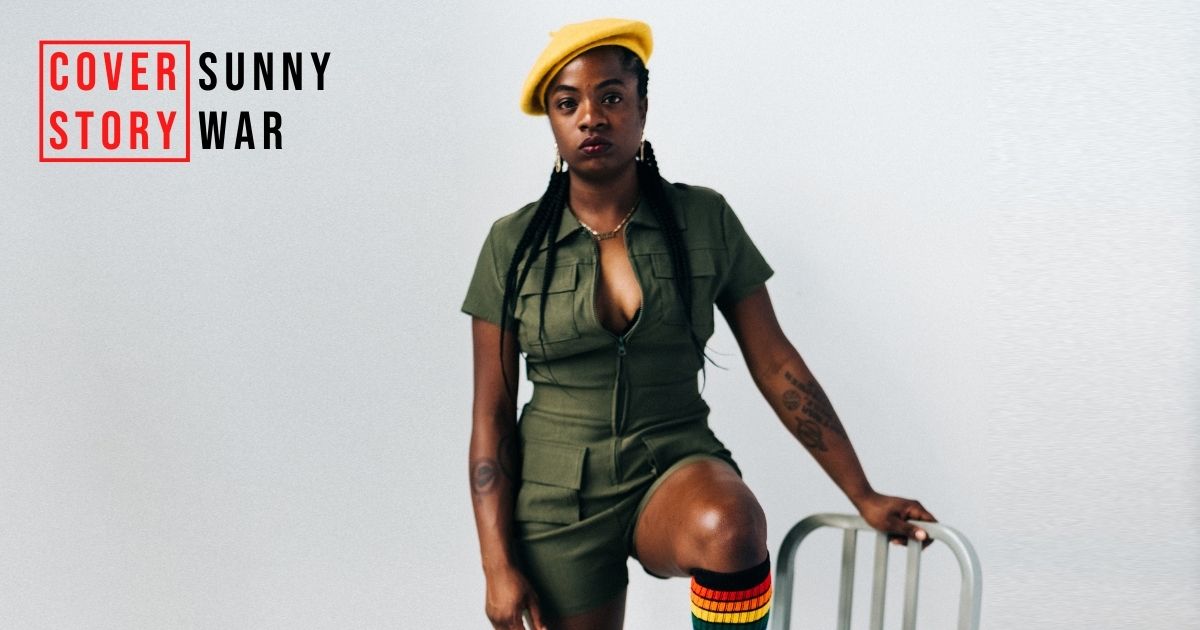Sunny War has done it again. Her brand new album, Armageddon in a Summer Dress (out February 21 via New West Records), is yet another anarcho-punk-roots masterpiece in her already deep-and-wide catalog of superlative recordings. The project builds on the sonic and rhetorical universe of her critically acclaimed and triumphantly received 2023 release, Anarchist Gospel, further expanding her charming, down-to-earth doctrine of mutual aid, community, and truly radical ideas – musically, and otherwise – exactly when we need them most.
That fact – the apropos timing of this collection of songs and their release – feels most striking because this music wasn’t written expressly to be a response to the current critical mass of fascism, oligarchy, and attacks on human rights in our country and around the world. Instead, the messages and morals in these songs are well-placed, not as slapdash reactions to the current political discourse or as activist-branded cash grabs in a terrifying societal moment, but by focusing on the real day-to-day implications of such imperialism as evidenced within War’s own life and her own inner circle.
On Armageddon’s opening track, “One Way Train,” she sings:
When there’s no one left to use
And no police or state
And the fascists and the classists
All evaporate
Won’t you meet me on the outskirts
Of my left brain
Close your eyes and take a ride
On a one way train
This album is exactly such a refuge on par with the singer’s “left brain” – and stemming directly from it! – in “One Way Train.” Armageddon is a respite from the noise of the news cycle and the sensationalism of consumerist media that needs not deny the realities we all witness and live through in order to be a resting place. This isn’t toxic positivity or “joy” and “hope” as cudgels to smack down criticism of inequalities, corruption, and ruling classes, thereby reinforcing the status quo. The songs of Armageddon in a Summer Dress do feel hopeful– but because they acknowledge and grapple with these issues, instead of willing them away under the rug or into hiding.
The deft and artful positioning of these incisive songs is directly tied to the ways anarchy, mutual aid, and solidarity have been woven into War’s life as an artist – and as a human, since even before she picked up the guitar. These are embodied, real concepts to Sunny, not just intellectual ideas and hypotheticals.
Punk and blues, folk and grunge ooze out of songs ripe for protest and resistance, but never packaged in a pink crocheted pussy cat hat or internet-ready bumper sticker quips. Sunny War knows the violence and tyranny we all face – she has faced it her entire life – and gives it the treatment it deserves, but without ever preaching or finger-wagging. The beliefs evident in Armageddon in a Summer Dress are never contingent on which team, “red or blue,” holds the power. Rather, the hope and tenacity in these songs feels derived from an intrinsic understanding that it’s always been “the many versus the few” and “the powerless versus the powerful” where the battle lines are drawn, instead.
“Walking Contradiction” – which features punk icon Steve Ignorant – is searing in its indictment of toothless neoliberalism having landed us in this exact political and social scenario:
…While the war pigs killed more kids today
Picket signs were made 6,000 miles away
And all the lefties and the liberals were marching so you know
Just because they pay their taxes doesn’t mean that they don’t know
All the pigs and the big wigs foaming at the mouth
Look down at us laughing like we’ll never figure out
All the war outside starts here at home
If they didn’t have our money they’d be fighting it alone
Doesn’t matter what your silly little signs have to say
‘Cause the genocide is funded by the taxes that you pay
Stopping and inhabiting this song, one of the project’s singles, and its message is illuminating. Especially when you realize it was written under the prior administration, but applies to the current one as well. And, perhaps, to every other presidential administration in U.S. history.
Armageddon in a Summer Dress still feels light and rewarding, though. It’s flowing and intuitive, and decidedly charming, even with these stark messages. Because, like most of Sunny War’s creative output, it actually drives to the heart of the issues we all turn over in our minds and on our screens each day, rather than tilting at superficial, sensational windmills that end up reinforcing our oligarchic status quo.
Of course, this album is not solely political and anarchic and intellectual. In fact, it’s not attempting to be cerebral and be-monocled at all. These are songs of love, of grief, of being an individual with a collective mindset in an individualist world with collective blindness.
There are songs of introspection, of perception, of self growth, of regression. Each feels fully realized in production, lush and deep. But there, in the gaps, in the bones of each track, are War’s signature fingerstyle licks, hooks, and turns of phrase on the guitar. She plays banjo throughout the project as well, and though the referenced genres evident on the project are endlessly rootsy, the blues and folk approach that charmed much of the bluegrass, folk, and Americana worlds previously serve a more subtle purpose here. War’s personality on her instruments is still prominent, and is ultimately successful playing more of a support role to the greater whole. Above all else, you can tell creating this album and these songs must have been so much fun to make.
Tré Burt, Valerie June, and John Doe – along with Ignorant – all guest on the record, which was produced by Andrija Tokic and recorded in Nashville, just up the highway from War’s current hometown of Chattanooga, Tennessee. Like Anarchist Gospel, seeing War’s community of collaborators grow and morph on the new project again speaks to the way this guitarist-songwriter-performer’s mission is an active, constructive one. It’s never merely a mantra hung on the wall to be admired from afar.
As we all face an ongoing apocalypse, as we each reckon with the indisputable fact that we are already living in dystopia – and have been – Armageddon in a Summer Dress is the perfect album to bring along with us. Dancing and flowing and twirling through the end of the world is certainly not a winning strategy, but dancing, marching, caring for one another, and lifting each other up despite Armageddon and imperialism might just do the trick.
She perhaps encapsulates this feeling best alongside wailing organ on “Bad Times:”
Had nothing so I had to borrow
What I owe’s gonna double tomorrow
Maybe now or in an hour or so
I’m gonna have to let everything go
So long room and board
And all the other things I can’t afford
You’re overrated anyway
I’ll be good soon as you
Bad times stay away
Bad times stay away
Bad times stay away
Bad times stay away…
This affirmation is not the end game, it is merely the beginning. If we take Sunny War’s ideals to heart, if we sing along at the top of our lungs, if we do mutual aid on a daily basis, if we take each moment, one individual second at a time– we, too, can navigate through Armageddon in a Summer Dress, emerging on the other side in a better, more just, more sunny world.
Sunny War is our Artist of the Month. Check out our exclusive interview with Sunny by her friend and peer Lizzie No here. Make sure to save our Essential Sunny War Playlist below while we gear up for the new album on February 21. Plus, follow BGS on social media as we dip back into our archives every day for all things Sunny during the entire month of February.
Photo Credit: Joshua Black Wilkins

